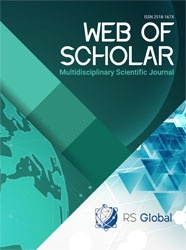THE DEVELOPMENT OF STUDENTS’ CRITICAL THINKING IN LEARNING A FOREIGN LANGUAGE
Abstract
This article deals with the issue of working out and incorporating in educational process of higher educational institutions of the innovative technology for developing skills of critical thinking for the future Management specialists. The research is aimed at revealing both theoretical and practical ideas about critical thinking development in English language teaching. To enhance critical thinking in learners, foreign language teachers use various methods and techniques, consequently there have been described the following methods such as “Lead-in”, “Socratic Questioning”, “Business role play”, “Active reading”, and “Translation”. The use of the above methods by foreign language teachers in classes contribute to the development of critical thinking among students and motivate them for learning a foreign language, as well as making the study process be possible to turn from routine work into interactive, interesting and challenging activities.
References
Oliver, H., Utermohlen, R. An Innovative Teaching Strategy: Using Critical Thinking to Give Students a Guide to the Future/ H. Oliver, R. Utermohlen. – Eric Document Reproduction Services № 389702
Clark, D. R. 2010. Bloom’s Taxonomy of Learning Domains. Retrieved July 10, 2012 from http://www.nwlink.com/~donclark/hrd/bloom.html/.
Anderson, L.W., Krathwohl, D.R. Taxomony for learning, teaching, and assessing. New York: Longman, 2001
Халперн Д. Психология критического мышления // СПб.: Питер, 2000. Б.512.
Клустер Д. Что такое критическое мышление // http://rus.1september.ru/article.php?ID=200202902
Наймушина Л.П. Применение технологий развития критического мышления на уроках английского языка // http://nsportal.ru/shkola/inostrannye-yazyki/library/2013/09/24/primenenie-tekhnologii-razvitiya-kriticheskogo
Заир-Бек С. И., Муштавинская И. В. Развитие критического мышления на уроке, Москва, Просвещение, 2011 г.
Майсейкова В. Е., Сидорова Е. А. Роль деловой игры на уроках английского языка в подготовке выпускников суворовских училищ к выбору будущей профессии [Текст] // Инновационные педагогические технологии: материалы VIII Междунар. науч. конф. (г. Казань, май 2018 г.). — Казань: Молодой ученый, 2018. —С.45-48.
Ливингстоун К. Ролевые игры в обучении иностранным языкам. – М., Высшая школа, 1988
Мұқтарханова А.М. Жоғары оқу орындарында ағылшын тілін оқытуда сыни ойлауды қалыптастыру // http://repository.enu.kz/
Views:
349
Downloads:
237
Copyright (c) 2019 The authors

This work is licensed under a Creative Commons Attribution 4.0 International License.
All articles are published in open-access and licensed under a Creative Commons Attribution 4.0 International License (CC BY 4.0). Hence, authors retain copyright to the content of the articles.
CC BY 4.0 License allows content to be copied, adapted, displayed, distributed, re-published or otherwise re-used for any purpose including for adaptation and commercial use provided the content is attributed.











